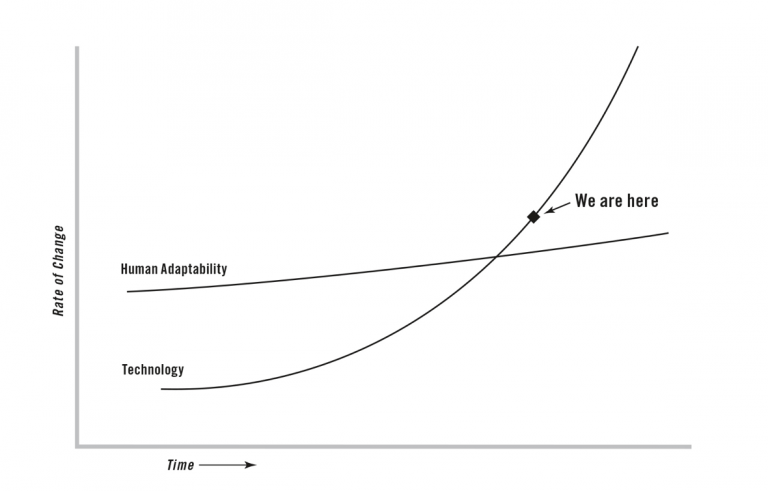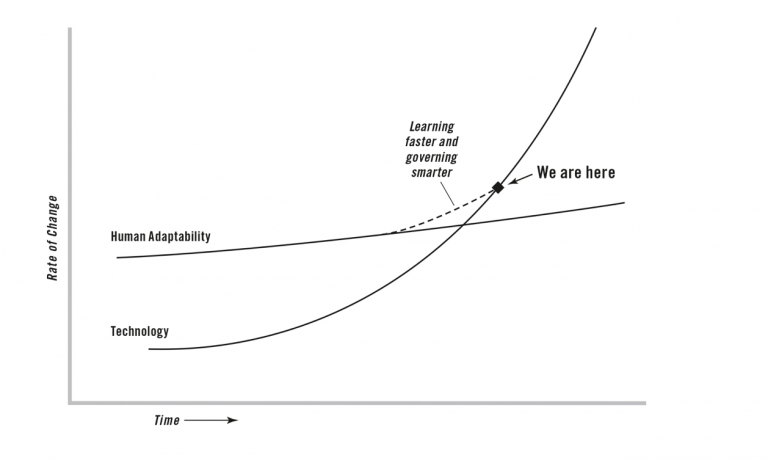Exponential Change
Flow State
We are taking leave from staid, predictable way of life which we became used to in the second half of the 20th Century. Our lives today are lived in constantly moving, dynamic flows of information and interaction enabled by technology. We have access through our devices to the library of everything, commanding instant responses to our every need. Gone for us are the rhythms of nature, with its phases of activity and rest. We now live lives of constant acceleration, perpetually loading, multi-loading, and overloading ourselves, as Bruch and Menges describe in an HBR article about organizations, as means of coping—unsuccessfully, one might add—with exponential rates of change.
Thomas Friedman, in his new book, Thank You for Being Late: An Optimist’s Guide to Thriving in the Age of Accelerations, describes the shift as akin to a “phase change” in chemistry, from a solid to a liquid state, in the way life works:
“What is the feature of a liquid? It feels friction-free. When you simultaneously take the friction and complexity out of more and more things and provide interactive one-touch solutions, all kinds of human-to-human and business-to-consumer and business-to-business interactions move from solids to liquids, from slow to fast, from their complexity being a burden and full of friction to their complexity becoming invisible and frictionless. And so whatever you want to move, compute, analyze or communicate can be done with less effort.”
But what Friedman describes is not the “flow” that comes with being at one with one’s own nature. It is a flow which comes from a higher state of molecular excitement. The energy it releases is now available for us to use. But there is no precedent in our collective experience of how we can do so successfully.
The Challenge
In psychology there is an interesting question that one poses when working with human potential: “How much vitality can the body bear?” Counterintuitively, the challenge of exploring our potential depends not on how well we bear constraint, but on how capable we are of managing activation. More excitation is harder to manage than less, and higher levels of energy require a great deal of learning, competence and discipline to sustain in balance.
We may now be at a similar inflection point in our societies. Most individuals have never learned to live their own lives in a state of constant change. Even fewer have developed the capacity to manage high levels of activation. Collectively we are even less well equipped, whether with our top-down organizational philosophies, our social and state bureaucracies, or our political ideologies, to cope with exponential rates of change triggered by technology.
Mismatch and Compensation
As Friedman argues, there is a mismatch between how fast the world is changing, and how quickly human beings have so far learned to adapt.

Our experience of the gap between these two is causing us stress. In companies it shows in majority disengagement rates and a burn-out epidemic. In our social lives, it shows in how we numb our emotions of being overwhelmed. As Brené Brown describes an insight of her research in her 2010 TedX Talk: “We are the most in-debt, obese, addicted and medicated adult cohort in U.S. history,” which likely applies not just to the U.S., but to technological societies in general. In political life, we see the consequences in the populist uprisings that have gripped even the core democracies of the Western world, as people feeling left behind protest their situation.
Exponential Learning
Friedman’s solution is to innovate in the way we learn to cope with exponential change. We need to learn faster, and govern smarter, he argues. Humanity evolved in an ecological paradise called the Holocene, in which the conditions for an emerging species like ourselves were just right. Our own success has brought an end to this paradise. We have walked out into the life of the Anthropocene, into a world of our own making, where we no longer have the luxury of living naïve lives, safe in the assumption that nature will provide for us.

The thinking which has gotten us here will not solve the problems it has created. As companies, we need to become self-aware of what our purpose is, and how we operate in an exponentially changing world. Personally, we need to learn to manage ourselves in the face of overwhelming change. Socially and politically, we are going to have to reinvent the social and environmental contracts which secure our peaceful and successful coexistence.
Optimism
Friedman is optimistic that we can rise to the challenge. We have all the tools and insights that we need to do the job. Each of us has his or her contribution to make.



Leave a comment